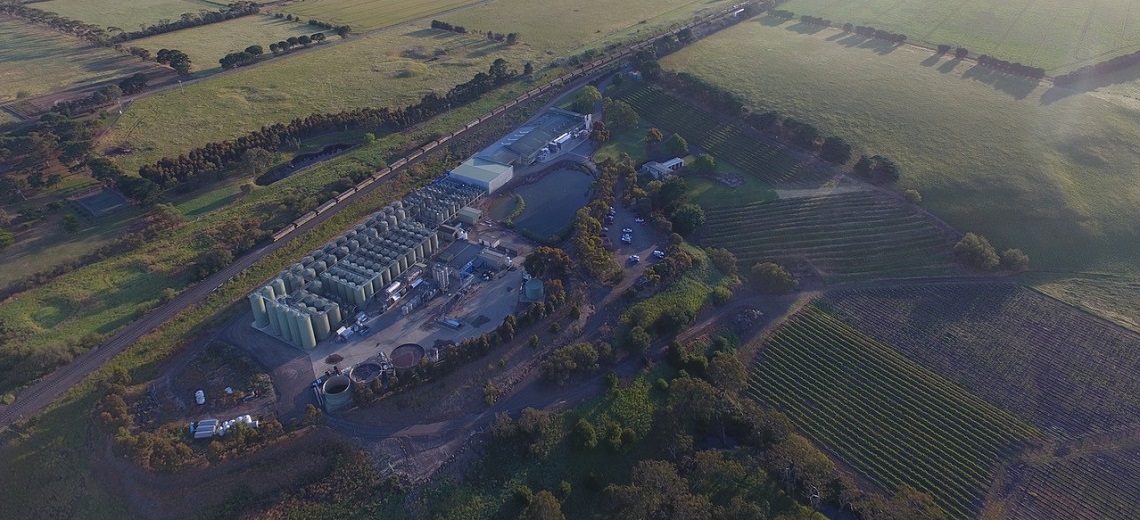Idyll Wine Co has been silently plugging away at its business goals over the last five years, moving from solely wine production to now produce a range of other categories.
While the company is largely unknown due to its association with private labels, its facility in Geelong has been growing at an incredible rate, largely driven by this diversification. In the last five years it has tripled its headcount and increased revenue three-fold.
Production capability was also increased from 12 million to 23 million bottles per year, forecast to rise again in 2021 to 30 million bottles. The recent addition of a second canning line will add another one million cans per week, in addition to the existing smaller line which produces one million cans per month. For 2021, Idyll is predicted to produce 20 million cans.
Andrew Byers, Executive Director of Idyll Wine Co told National Liquor News the key to such growth was the business’ forward thinking, saying: “It really comes back to that diversification that was undertaken.
“We have traditionally been a wine producer, in 2015 we were exclusively putting wine through here. And over the last five years we have really worked to diversify the products that we’re taking to market so that’s included ciders and then RTDs brands, and then branched out again into seltzers and those sorts of products as well.
“What we’ve been able to do is really get away from one segment of the market and actually broaden what we can do and what markets we can target, which has allowed us to grow. COVID had a big impact on us but the China tariffs are probably just as large an impact as well on a wine business.
“If we hadn’t gone through that diversification that would have made our success even more difficult.”
Byers said the canning line element to this diversification has seen great results ever since the first machine was installed.
“We put the first canning line in about two years ago, and that was really to support our cider business. When we started the cider it was going through the bottling lines because it runs similar to packaging wine,” he said.
“But as part of that, our customers were looking for a can solution as well, so we put the first canning line in which was successful…. Then we invested in our second canning line, to help us gain better capacity to work with the growing cider and RTD space.”
Despite its recent success, Idyll has no plans on becoming complacent, with eyes already turned to its next stage of diversification.
Byers explained: “The next step is going into broadening our capacity to package, so we’re going to put in a kegging line that’s due to arrive in August 2021.”
“It’s really just being flexible enough with what we do and how we do it to keep up with market trends…. and be able to diversify further as those trends continue growing.”
Sustainability woven into DNA
With sustainability central to its business strategy, Idyll Wine Co adopted a suite of large-scale and long-term sustainable practices throughout its beverage production cycles.
“It comes down to that business philosophy that you’re trying to tick all the boxes. You’re trying to make sure that your corporate governance and how you interact with your local environment, your local communities, and your staff on site, all have that conscious aspect,” Byers said.
“Sustainability is one of those things that we’ve always been pretty focused on, but it’s just become more and more important to us as we’ve grown and expanded. It’s always been in the back of our minds.”
Even with its unprecedented growth, Idyll has maintained its plan to keep “a small footprint from a sustainability point of view”.
Byers continued: “Taking on renewable energy sources for all of our electricity, recycling all of our water, having fantastic cardboard, plastic and glass recycling initiatives in place, and really trying to reduce our waste as much as possible is a part of what our mantra has always been.”
Supporting brands, not labels
Byers said the way that retailers approach private labels these days has changed. Its about more than putting a label on any old bottle – rather, he finds that more of the industry is really putting time and effort into supporting the brands, their stories and where they come from.
“We’ve been a supplier in that private label space for a long time and what we’ve seen over the last two or three years is that retailers have been investing more and more into brands, rather than just being a label focused retailer,” he said.
“We’re starting to see real products coming out of this support, we’ve got products ourselves that we’ve been working on for 10 years as private labels that come from the same growers and the same vineyards.
“It is the understanding that there aren’t quick fixes and investing more and more into brands allows the industry to work behind it with long term plans and aspirations of growth. But it also helps out in the vineyards to actually develop these brands into something that’s got some long term future and actually evolves.”

